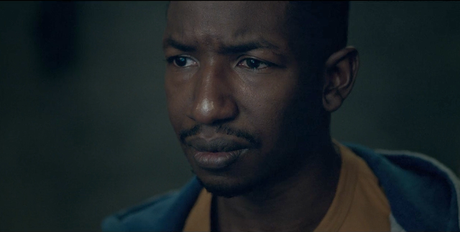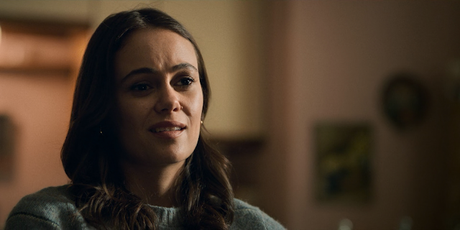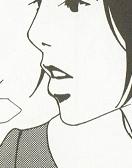
In terms of horror film staples, Archive 81 is like a wild, dissonant assortment: it has an ancient coven of witches called the Baldung, a demon who may be connected to a meteor that crashed into Earth millions of years ago, hallucinogenic alien mold that primes its consumers to open a gate to a different dimension, Satanic occultist societies obsessed with arcane and murderous rituals that span a century, maybe the ability to commune with the past via videotape – the mystery is manifold and complex, sometimes overwhelmingly so. What grounds the show regardless is the characters and the relationships – a meaningful and close friendship in the past that breaks, and one in the present that endures, and an unlikely connection through time that blossoms, solely nourished by video and audio recordings.
The beauty of Archive 81 lies in these relationships, but also in its clear love of storytelling and the media it comes packaged in. At the center of the story are Dan (Mamoudou Athie), a highly skilled restaurateur of video and film media for the Museum of the Moving Image in New York (all of his T-shirts are great), and Melody (Dina Shihabi), a PhD candidate in 1994 who wants to create an oral history of the Visser apartment building with a complicated past, a mission that is only a cover for her attempt to find her birth mother, whose last and only letter was addressed from the Visser. Melody recorded a number of tapes with her camcorder, a record that was damaged in the fire that destroyed the building, and Dan is tasked by a private business man (of a sprawling corporation) to restore the tapes for a significant sum.
What sells Dan on the project isn’t so much the promised money at the end of the process, but the fact that he feels an instant connection to Melody once he watches her tapes: it’s a great moment in Archive 81 because it mirrors what happens to a viewer of any narrative when they fall in love with a character. She is vibrant, funny – the first time Dan sees her, she is talking to her roommate Anabelle (Julia Chan) about the project, about her worries that she won’t be able to get the people who live at the Visser to open up to her. Dan watches her, and is smitten, and it’s because she is so easy to like instantly. Dan agrees to all the ominous requests that Virgil Davenport makes of him – he has to travel to a remote compound in the Catskills to restore the tapes, where there is no internet yet and cell reception is spotty, so that his only connection to the outside world becomes a landline. It mirrors the reality that he is slowly and meticulously restoring – there’s no internet or mobile phones for Melody either. The process of making the tapes watchable again is incredibly satisfying – Dan cleans them, transfers the spools into new casings, watches what he finds while the isolation slowly gets to him (his only friend and talking partner becomes Ratty, a rodent he finds gnawing through his provisions) – and then, of course, weird things starts to happen, both on the tapes and in his reality.

The past isn’t just communicated on the tapes – Melody is our second main character, and so we travel back with her, opening up the question if Dan really sees everything that we do when we’re with her. She records almost constantly, but we don’t have the same perspective he has. Her journey of discovery turns mysterious almost instantly when weird noises drift up to her apartment through the heating duct – a song, or a chant, or breathing – and she begins to hear different theories about what happens in the building’s community room. It could be an orgy, or the meetings of a historical society, as the medievalist Samuel (Evan Jonigkeit) who is briefly presented as a possible love interest for her suggests – but when she hears the sounds come together in an underground opera performance by another inhabitant of the Visser, it makes her almost instantly nauseated, as if the sounds are an infection. Dan remembers his sister playing the same song on the piano – but is this a real memory, or one affected by what he has seen on the screen? Melody befriends the building’s “Girl Friday” Jess (a fantastic Ariana Neal), a fourteen year old who runs errands for everyone and begins opening doors for her so she can interview everyone, but it also drags her deeper into the mystery of the building when Jess begins talking about holding a new world inside of her and experiences violent seizures in front of her that nobody wants to take her to a doctor for.
It doesn’t take long for Melody to realize that many things are wrong at the Visser, and Dan realises along with her, depending on his podcast-creator friend Mark (Matt McGorry) to look things up for him on the internet in the outside world. Both Dan and Melody share a history of mental distress, and so their individual perceptions here become suspect to both their friends and the audience – are they misinterpreting things, are they seeing things that aren’t there? Does Melody’s personal history – being left by her birthmother in a church, then raised by the Catholic church in a way that made her despise religious zeal for life – affect her interpretation of what she is experiencing to an extent we now cannot trust what she thinks she is seeing? Dan gets dragged in deeper when he sees his own father, a psychiatrist, appear in one of Melody’s later recordings, appearing to drag her away from the Visser to an institution while Melody pleads to the filming camera to be saved and found. This connects Dan intimately to Melody’s life – his dad and whole family died in a tragic fire when he was a child, and he thought that he worked as a university professor, a whole secret life unfolding in scraps, especially once Mark unearths session tapes of him and Melody.
There are many mysteries here that are uncovered – the historical society is actually a satanic cult obsessed with a historical society that met in the mansion that met the same fate as the Visser, and upon which it was built – and Samuel is its leader, desperate to create a ritual to awaken a demon and open a portal to a different world. Archive 81 is beautifully preoccupied with media, especially obsolete forms – and a rumoured snuff film from the 1920s (the beginnings of motion picture cameras) appears as the inspiration behind another lost film called The Circle that just happens to be a piece of work that Dan managed to restore just before he took on Davenport’s project. Obviously, Dan works with Melody’s camcorder recordings, but throughout Archive 81, he also discovers audio recordings of his father’s sessions with Melody (he turns out to have been her therapist) and tapes made by Jess with a PXL2000, a truly obscure piece of technology that only briefly existed (marketed towards children, it recorded lo-fi video on audio cassette tapes – Archive 81 has the same fascination with the history of objects that make William Gibson’s novel so incredibly tactile). This isn’t just a journey through stories and the past, it is also a history of the medium of storytelling, from the early days of cameras to Dan’s advanced equipment to try and preserve a past recorded with obsolete technology – with holding on to something that is threatening to disappear forever.
In Archive 81’s singular journey back to the 1920s, we see Melody’s experience in 1994 mirrored: two brothers and their sister in law became obsessed with opening a gate to another world, driven by grief, willing to groom an Irish maid the same way that Samuel is grooming Jess in Melody’s present – willing to bring a human sacrifice. This past is as fascinated with technology as Dan is, mixing mythology and spirituality with the new advances of the modern age. Where 1994’s pop culture appears almost muted – Melody references the Beastie Boys, and there is one scene with my favorite Sonic Youth song in the background, but otherwise, the references are subtle, not overbearing (in a period of time where a lot of shows are going back to the 90s) – the roaring party that precedes the first ritual (that became the snuff film – the maid is the first victim) is full roaring Twenties, with a band and costumes to celebrate the passing of a comet visible from Earth.
But the emotional core of the show remains the relationship that builds between Dan and Melody, especially once they appear to be communicating – Melody begins appearing to Dan, and the thing he says to her echo back to the recordings, as if he is communicating with her through time. In a way, this is a love story (and I do agree that it is unfortunate that Melody isn’t explicitly queer - yet - , as she was in the podcast this is loosely based on, because a lot of the earlier subtext makes little sense without it), with enough of Melody contained in the tapes that she is making to create a full, vibrant picture of her in Dan’s head. He becomes convinced that he can save her – and because miraculously, this is not a cynical show, his best friend, instead of taking the many dark paths that the show suggests are open to him for betrayal, sticks by his side, not for profit or fame but because he loves his best friend. This feels like a mirror of Melody’s relationship with her queer best friend and roommate Anabelle – who visits her at the Visser and then doesn’t leave, caught up in the building, transfixed by the story of an artist who worked and died there and her wife (they pretended to be sisters back in the 70s, and in spite of that tragedy, Cassandra’s repetition of “My Eleanor” soon takes on a much more sinister and creepy tone). Anabelle lost Melody, and she spent the rest of her life in a psychiatric hospital, but Dan thinks he has found a way to open the door to the dimension in which she is now trapped (Samuel’s ritual once again not turning out the way it is meant to, perhaps because he never considered that he shouldn’t be the center of it) – the final episode sets up a second season perfectly.
2022-, crated by Rebecca Sonnenshine, starring Mamoudou Athie, Dina Shihabi, Julia Chan, Evan Jonigkeit, Matt McGorry, Ariana Neal, Martin Donovan, Kate Eastman, Charlie Hudson III, Kristin Griffith.

